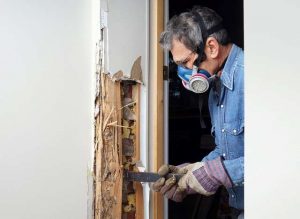 The most common building material used to construct houses, due to its capability to provide a warm and cozy atmosphere, is wood. It is also used to make nice furniture, such as chairs, closets, and dressers. While it is so commonly used, it has few enemies, particularly termites. These tiny creatures love wood and can eat away furniture and books and cause structural damage to your property. While termites have no implication on your health since they do not transmit diseases, they can cause significant damage to your home.
The most common building material used to construct houses, due to its capability to provide a warm and cozy atmosphere, is wood. It is also used to make nice furniture, such as chairs, closets, and dressers. While it is so commonly used, it has few enemies, particularly termites. These tiny creatures love wood and can eat away furniture and books and cause structural damage to your property. While termites have no implication on your health since they do not transmit diseases, they can cause significant damage to your home.
You must inspect your property regularly as termites are silent killers, and an infestation may cause serious consequences. The following can determine if there is an infestation:
- Mud tunnels – Termites love their privacy and cannot survive if exposed to air. As such, they build these pencil-sized mud tunnels that sometimes lead to the nest underground. You can see these tunnels on your walls, foundation, or any other wooden structure.
- Discarded wings – Termites leave scattered, dry wings behind near windows, air vents, spider webs, and doors. This is a sign of reproduction that means your termite infestation is growing.
- Hollow or cracked wood – If you have hollowed or cracked wooden floorboards or furniture skirting, the termites have likely eaten the wood from the inside out. You can check for wood damage by tapping on the wood to see if the sound is hollow or weak points are present. These are tell-tale signs of termite activity.
- Droppings or frass – Termites typically leave droppings around and outside doorways and furniture that resemble sawdust or powder, as they remove the excess dust from devouring your property.
- Swarmers – The young flying termites usually are seen around the house in the springtime. They tend to swarm whenever their current nest is too small to accommodate them, so they move out to search for new homes. A strong indication of an infestation is seeing flying termites near light sources such as bulbs and lamps.
- Noises – if you put your ear against the infested structure and hear a clicking sound, they are either feeding or banging their heads against the wood. The best time for this inspection is during the night when they generally feed.
 Prevention
Prevention
Now that you are aware of the signs of termite infestation, you can do a walk-through and inspect your property to find the pests before they cause damage you cannot reverse. One considerable advantage termites have over humans is that we are not knowledgeable about protecting ourselves against an infestation. If you, however, want to prevent termites from making their way onto your property, these preventative steps can ensure they steer clear:
- Try to keep your property clean and dry. Your foundation could be the entry point for termites. You must ensure it is free from debris, dust, and dirt. Please do not use a mulch to cover up any holes as they only attract more pests and rodents.
- Remove any clutter from around the house. Get rid of old furniture, newspaper, books or magazine, or documents. These can harbor termites and other pests such as cockroaches.
- Termites need water, so keep your property clean and dry. This includes those areas such as pipes, drainage units, ducts, and gutters. If these places are not kept dry, they can become potential entry points. Conduct regular checks and cleaning.
- Termites thrive in humidity. If your air conditioning unit does not remove humidity, you can get a dehumidifier. This is an essential implement in your mission to prevent termites, especially if you live in an area with high humidity.
- Trim tree branches and shrubbery regularly as they allow moisture to build up around the property and act as a path for termites and even rodents to enter your home.
- You can have your home or other property regularly inspected by professionals.
- Use termite-resistant wood in your home, especially in areas where the wood must touch the ground.
Treatment
In the event you have a termite infestation, try not to disturb the tiny creatures. Using sprays can trigger their instincts and signal them to move to another spot, which allows them to keep damaging your property from another location.
Termite removal and prevention is usually a job for termite specialists, like Synergy². The following are the four main termite treatment methods utilized by pest control companies specializing in termites:
Termite Bait
This method involves the strategic placement of bait stations around the home in areas termites can find them. The bait typically has a powerful insecticide or insect growth regulator that can kill termites slowly. It works because termites searching for food readily take the bait and carry it back to the nest and infect the others.
While termite bait effectively destroys the infestation, it can take several months to work on the insects, and it requires a lot of time, maintenance, and monitoring to make sure bait is still present at the stations.
Liquid-soil Termiticides
This is a long-term liquid barrier treatment designed to keep termites inside the structure from getting into the moisture necessary for survival. After applying the liquid, a barrier is created. This lasts for roughly five years. However, it is not easy to implement. The treatment involves digging a trench around the property and pouring the liquid in.
Wood Treatments
Instead of setting up bait stations and treating the soil, you can employ wood treatment. This technique involves applying a compound directly to the wood to soak in, by either spraying or injecting foams. Wood treatment kills existing infestations and soaks deeply into wood to prevent any future incidents.
It is best to inject termite foam into the creases and cracks of previous structures to soak into unpainted sections.
Treating Building Materials with Termiticides
A proactive way to prevent termite infestation is to treat the materials with termiticides before construction even starts. Spraying or painting lumber and other building materials before use can actively reduce termite infestation.
You can even opt to use naturally-resistant elements such as concrete, wood, and metal to prevent a future problem.
While termites can be thorns in your side, once you adhere to the preventative measures, have termite professionals conduct frequent termite inspections, and take note of the signs, you should keep termites far away from your home or even win the fight against them.

